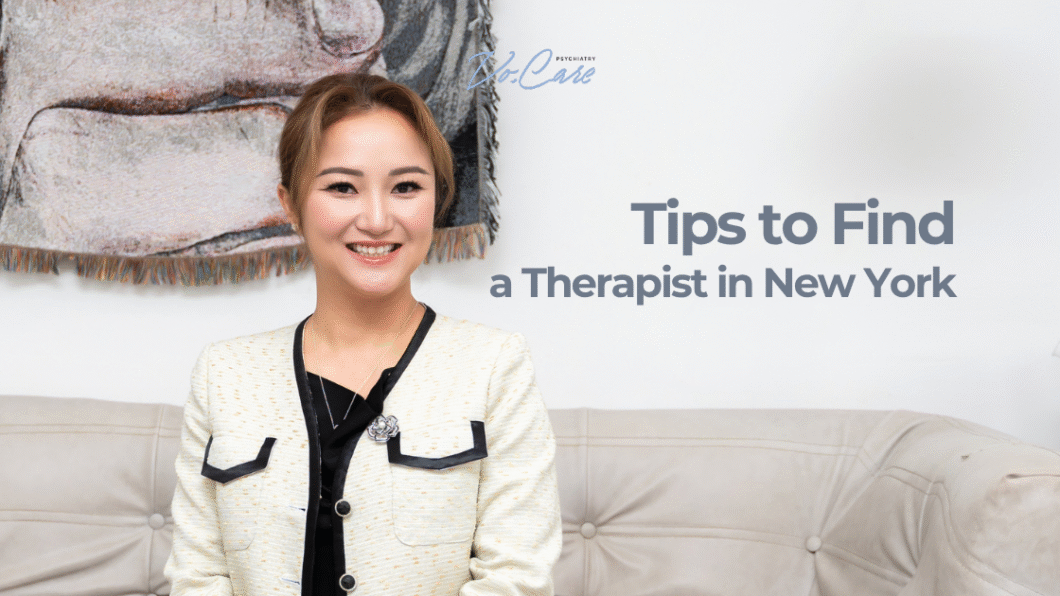TL;DR
If you’re trying to find a therapist in New York, start by naming your goals and preferred style (reflective vs. skills-based), then lock the logistics (in-person vs. telehealth, neighborhood, budget/insurance). Use trusted directories (Psychology Today, Zocdoc), explore community options (Open Path, university clinics, hospital outpatient centers), and treat “fit” as essential. It’s okay to meet a few therapists before landing on the right match.
New York offers endless options—from coffee to pastrami—and the same goes for mental health care. But unlike choosing lunch, trying to find a therapist in New York involves availability, cost, insurance, and the feel of the relationship. With so many choices, the process can feel overwhelming.
As awareness grows around mental health, choosing the right therapist is one of the most meaningful steps you can take.
This guide shares simple, practical steps to help you find a therapist in New York who fits your needs.

NYC Therapy Landscape: Why the Search Feels Big
New York has one of the highest concentrations of mental health professionals in the country, which means plenty of choice—and high demand. Some clinicians keep waitlists or have limited openings.
Diversity shapes the scene. You’ll find therapists from many cultural backgrounds, speaking multiple languages, and using approaches that range from evidence-based methods to mindfulness-based and creative modalities. Prefer traditional talk therapy, virtual sessions, or hybrid? You’ll find options across the city.
Start with What Matters to You
Before you search, pause and clarify your goals. Are you managing stress, navigating a life transition, working on relationships, or healing from trauma? Clear aims narrow the field.
Then consider style. Do you prefer a reflective, emotion-focused approach—or something structured with tools and strategies (e.g., CBT, DBT, ACT)? The best approach is the one you’ll actually use.
Lock the logistics:
-
Format – in-person, telehealth, or hybrid
-
Location – neighborhood and commute comfort
-
Budget/insurance – private pay, in-network, or out-of-network with reimbursement
-
Schedule – evenings/weekends, frequency, and session length
These guardrails help you find a therapist in New York faster.
Where New Yorkers Successfully Find Therapists
When you’re trying to find a therapist in New York, it helps to treat the search like a quick funnel: start wide, then narrow with filters that match your goals, budget, and schedule. Mix sources—trusted directories for breadth, insurance-friendly platforms for cost clarity, telehealth apps for speed, and community clinics or university programs for affordability.
Add one more layer of real-world insight by asking friends or local groups about their experiences. Using two or three of these routes simultaneously usually yields a strong shortlist quickly.
Directories and Matching Platforms
-
Psychology Today – broad directory; filter by neighborhood, insurance, fee range, specialties (anxiety, relationships, trauma, burnout).
-
Zocdoc – helpful for finding the soonest openings and booking online.
Virtual Therapy
-
BetterHelp, Talkspace – online therapy via chat or video with flexible plans.
-
Thriveworks, OnlineTherapyNYC – licensed clinicians across NY offering telehealth; many list transparent rates.
Lower-cost/Community Options
-
University clinics – NYU, Columbia, Fordham, Hofstra, and others run supervised training clinics at reduced rates.
-
Hospital outpatient centers – Mount Sinai and NewYork-Presbyterian operate clinics open to the public.
Word of Mouth
Personal recommendations still help. Ask trusted friends or colleagues, and check local communities (e.g., r/AskNYC). Firsthand experiences reveal style, reliability, and responsiveness.
Costs and Insurance—What to Expect
Many private clinicians don’t bill insurance directly due to reimbursement rates. If they’re out-of-network, you may pay upfront and submit for partial reimbursement. Confirm fees, superbills, and cancellation policies before booking.
What a Good Fit Feels Like
A good fit feels steady and safe. You feel understood when talking about hard things, sessions have a natural rhythm, and you leave with clarity, relief, or simple next steps. Over time, your therapist remembers what matters to you, helps connect patterns across weeks, and you notice subtle shifts in how you think, cope, and respond. If the first match doesn’t land, that’s okay—styles and personalities differ. Trust your read, make adjustments, and keep looking until the relationship supports your progress.

Putting It All Together
To find a therapist in New York, start with your goals and non-negotiables, explore reputable platforms and community routes, and keep “fit” at the center of your search. Take your time, ask clear questions, and trust your read of the relationship. The aim is steady progress with someone who helps you feel seen, supported, and understood.
If you want a guided next step, Vo.Care offers psychiatry, behavioral therapy, and talk therapy. We can help you clarify goals, discuss treatment options, and match you with a clinician who aligns with your needs.
Learn more or book an intro consult at vo.care/new-patient/—and let’s figure out what support looks like for you right now.
FAQ: Find a Therapist in New York
Anywhere from a few days to a few weeks. Telehealth often has faster openings; in-person specialists may have waitlists. Send 3–5 inquiries at once to improve your odds.
You may still be eligible for partial or full reimbursement through out-of-network benefits.
It’s always best to contact your insurance provider directly to confirm if your plan includes out-of-network coverage and understand what percentage or amount they reimburse.
When you call, you can ask questions like:
-
“Does my plan include out-of-network benefits for outpatient mental health services?”
-
“What’s my out-of-network deductible for mental health services?”
-
“Do I need to meet my out-of-network deductible before benefits apply?”
Common credentials include PhD/PsyD (psychologist), LCSW (clinical social worker), LMHC (mental health counselor), LMFT (marriage & family therapist), and MD/DO (psychiatrist). Licensure indicates training, supervision, and ethics standards.
Effectiveness depends on your goals and preference. For example, CBT is skills-focused for thoughts/behaviors; psychodynamic explores patterns and history; EMDR is often used for trauma. A good therapist will match methods to your needs.
Ask:
-
“How do you typically work with concerns like mine?”
-
“What does progress look like in the first month?”
-
“How do we set goals and measure change?”
Notice how you feel during the call—calm, clear, and respected is a good sign.
Filter directories for language, cultural focus, or specific communities. Many bios name lived experience and training in multicultural frameworks. Trust your comfort and ask direct questions about cultural humility and experience.
Yes. It’s common to try another clinician. You can request referrals from your current therapist or your insurer’s directory.
Ask about biweekly schedules, sliding scale, group therapy, or skills classes. Some clinics offer brief-treatment models focused on targeted goals.
If you’re in the U.S. and in crisis, call or text 988 for the Suicide & Crisis Lifeline, or go to the nearest emergency room. For non-urgent support, ask prospective therapists about interim check-ins or bridge resources.

